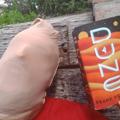Wild Woila reviewed I Contain Multitudes by Ed Yong
A celebration of life & its complexity
4 stars
Delves into the many varied & amazing ways humans & animals have evolved to depend upon microbes. Most of this was familiar to me already, though told in the author's excellent clear & awed way. New was the incredible nesting of microbes within high-order animal cells, with each doing distinct jobs, such that none can survive without the others. Yong is always good for a celebration of life & its complexity.
Delves into the many varied & amazing ways humans & animals have evolved to depend upon microbes. Most of this was familiar to me already, though told in the author's excellent clear & awed way. New was the incredible nesting of microbes within high-order animal cells, with each doing distinct jobs, such that none can survive without the others. Yong is always good for a celebration of life & its complexity.






